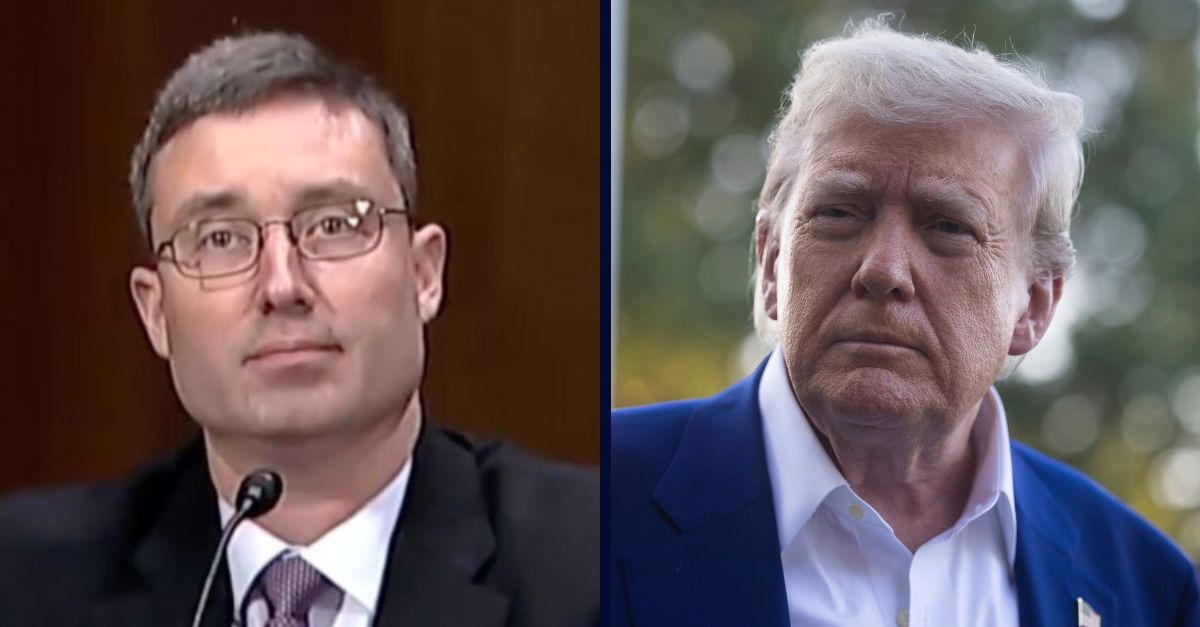
Left: U.S. District Judge Brian Murphy of the District of Massachusetts in April 2024 (Instagram/Senate Judiciary Democrats). Right: President Donald Trump speaks with reporters on the South Lawn of the White House before boarding Marine One on June 24, 2025 (Francis Chung/POLITICO via AP Images).
A federal judge”s order barring eight men from being deported to South Sudan “remains in full force and effect,” he said on Monday, despite the Supreme Court staying his nationwide preliminary injunction blocking third-country deportations.
While U.S. District Judge Brian Murphy’s April injunction — which kept people deemed illegal immigrants from being deported to countries with which they have no official ties — has been lifted at large, Murphy contends that he may still rule on individual cases, such as the men stuck in Djibouti who were set to be sent to South Sudan, a country entrenched in a civil war.
And it appears that the high court’s lack of explanation in its Monday stay opened the door for Murphy to take such an action.
Murphy’s May 21 order regarding the eight deportees “remains in full force and effect, notwithstanding today’s stay of the Preliminary Injunction,” the judge, a Boston-based Joe Biden appointee, wrote in a docket-only order on Tuesday. He was responding to an emergency motion filed by the eight men in the wake of the high court’s ruling, finding the motion “unnecessary” as, in his eyes, they are already protected under his previous ruling uninfluenced by the Supreme Court’s stay.
He pointed to the scathing dissent from Justice Sonia Sotomayor.
“[T]he District Court’s remedial orders [were] not properly before [the Supreme] Court because the Government has not appealed them, nor sought a stay pending a forthcoming appeal,” he quoted from her writing, joined by the court’s two other liberal justices, Elena Kagan and Ketanji Brown Jackson.
The Trump administration took clear notice of Murphy’s Monday action.
“The district court judge in Boston has said he is going to defy the Supreme Court’s ruling, so expect fireworks tomorrow when we hold this judge accountable for refusing to obey the Supreme Court,” White House adviser Stephen Miller told Fox News’ Sean Hannity on Monday night after celebrating the high court’s ruling. However, as previously stated, Murphy has not actually “said he is going to defy” the Supreme Court; he is rather contending that the stay on his nationwide injunction does not apply to this specific case.
Still, the men’s request to be returned to the U.S. while their immigration cases proceed was not granted, and they remain in Djibouti, keeping them in more of a fragile middle ground than, say, O.C.G., a Guatemalan man who Murphy saw returned to the U.S. after the Trump administration admitted he was “wrongfully” deported to Mexico.
At the core of the third-country deportation cases is deportees’ claims that they must be given an opportunity to share their fears of danger in the country with which they have no official affiliation. With the eight men in Djibouti, those fears stems from reports of human rights violations in South Sudan; with O.C.G., it concerned his fear of being persecuted in Mexico over his sexuality and given that he was mistreated while traveling through there just last year.
Sotomayor argued the lifting of the nationwide injunction exposes “thousands to the risk of torture or death.”
“Apparently, the Court finds the idea that thousands will suffer violence in farflung locales more palatable than the remote possibility that a District Court exceeded its remedial powers when it ordered the Government to provide notice and process to which the plaintiffs are constitutionally and statutorily entitled,” she concluded. “That use of discretion is as incomprehensible as it is inexcusable.”

